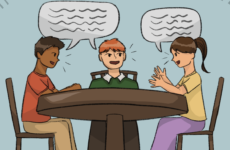
Graphic by Evelyn Kim ’25/The Choate News
By Rachel Fan ’27
While visiting Choate on April 17 as a part of a panel on global peacekeeping and journalism, analyst and author Mr. Aaron David Miller said, “Together, we can turn the word ‘me’ into ‘we.’” His words perfectly encapsulate the spirit of Choate’s community service program: by inspiring and empowering students to positively impact communities through outreach and engagement, we can work together to make a greater impact and transform the world into a better place. Although some may argue that Choate’s community service requirement detracts from its purpose and makes students complete tasks extrinsically, I firmly believe that community service is a valuable opportunity to learn about our surrounding communities.
Being a mandatory requirement at Choate does not detract from community service’s positive impact. Additionally, Choate’s program has done a wonderful job of evolving with society’s evolving needs.
“It has definitely grown over the years as societal needs have become more and more dire,” Director of Community Service Ms. Melissa Koomson said. Considering all the global issues that have occurred recently, I agree that there is an ever-growing need for service work. From the lasting effects of the Covid-19 pandemic to the growing impacts of environmental degradation, society continues to face challenges that require integrated community service at schools.
I recently learned about Lawrence Kohlberg’s Stages of Moral Reasoning in my Introduction to Psychology class, which led me to contemplate the value of community service. The first stage of moral reasoning is “preconventional,” where individuals only care about themselves, their wants, and their needs. But by engaging in community service, students can move beyond this stage into the “conventional” and “postconventional” stages, developing a sense of empathy and responsibility towards others.
In these stages, they learn that their actions can positively impact the world around them. Consequently, they become motivated to act for the benefit of their community rather than only themselves. This is why I believe that community service should be required in schools. It instills essential values and helps students become responsible, empathetic, and engaged members of society.
To all boarding students, when was the last time you left the town of Wallingford? The answer for residential students at Choate can range anywhere from a couple of days to a couple of weeks ago. Since boarders live on Choate’s campus, it is essential to find ways to escape Choate’s bubble and reconnect with our surrounding community.
Escaping such a bubble is essential because it allows boarding students to explore new places, meet new people, and gain a better understanding of the world outside of Choate’s campus, and a great way to venture outside is to engage in community service. By giving back to the population surrounding us, “students are finding purpose and understanding the issues around them better,” Ms. Koomson noted.
With exposure and consistent engagement in the surrounding communities, Choate students can avoid the risk of potential ignorance. “Community service is not just volunteering your time for unpaid work,” Ms. Koomson said, adding, “That reflection process is really important to think about your place in the world and how we can make change.” Although handing out supplies in food pantries might not be as appealing as spending an afternoon with friends, volunteering helps those in need and inspires others to do the same.
Additionally, volunteering provides personal benefits by helping students to develop new skills, gain experience, and build relationships with like-minded individuals. I believe that we all have the power within us to make change for the greater good, and Choate should continue our Community Service Program to bring that power to fruition.
If I were to summarize community service at Choate in one word, it would be “opportunity.” The requirement provides students with numerous eye-opening opportunities to develop valuable skills, contribute to their communities, and positively impact the world.


